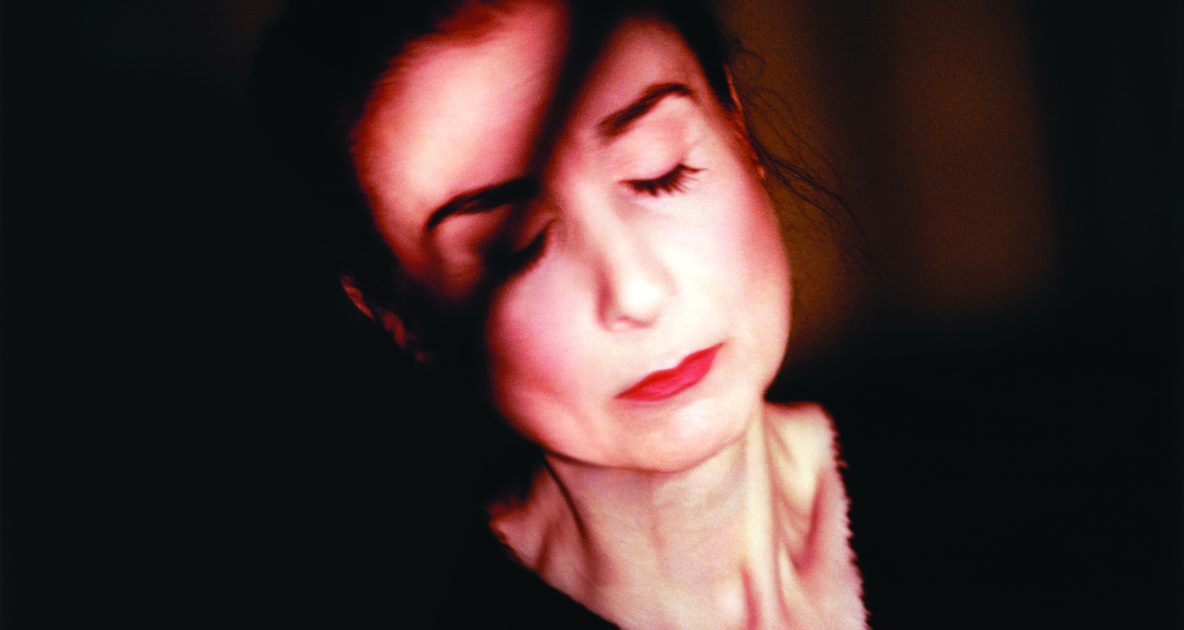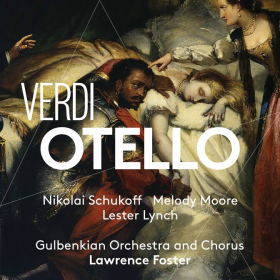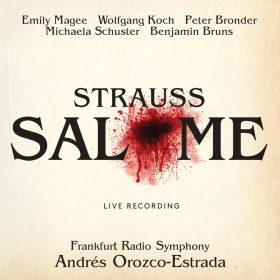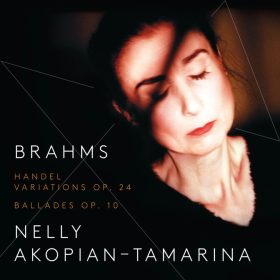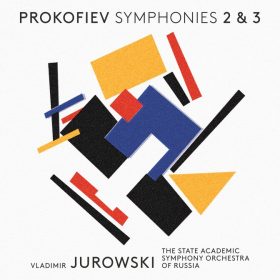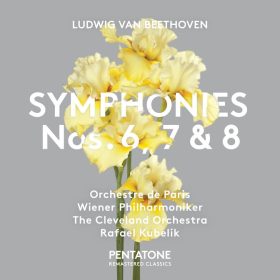Press release: Baarn, The Netherlands, October, 2017
In November, PENTATONE releases five enthralling additions to their catalogue: Verdi’s Otello performed by Nikolai Schukoff, Melody Moore, and Lester Lynch, the Gulbenkian Orchestra and Chorus under the baton of Lawrence Foster; Salome performed by the Frankfurt Radio Symphony conducted by Andres Orozco Estrada; Nelly Akopian-Tamarina in a a rare studio recording for PENTATONE with a luminous performance of Brahms’ Variations and Fugue on a Theme of Handel, Op. 24 and the introspective Four Ballades, Op. 10.; the first album of a new cycle of the complete symphonies of Prokofiev’s symphonic oeuvre with Vladimir Jurowski and the State Academic Symphony Orchestra of Russia “Evgeny Svetlanov”; and a new “remastered classic” album.
Verdi’s perfect synthesis of action and music
Nikolai Schukoff, Melody Moore, Lester Lynch , Kevin Short, Lawrence Foster , Gulbenkian Orchestra

The opera Otello by Giuseppe Verdi and Arrigo Boito not only represents the outstanding result of an intensely fruitful creative collaboration between composer and librettist, but also one of the most important core works in the opera repertoire. With his musical setting of Shakespeare’s play, the composition of which took him several years, Verdi also achieved a new level of quality within the framework of his operatic oeuvre. His path was resolute and consistent, leading him away from structured numbers of arias, recitatives and ensembles, and towards the through-composed, large-scale dramatic form. All this based on the timeless literary foundation of Shakespeare’s play.
This drama is supported by music that, especially in the depths of the orchestral scoring, subtly penetrates the psyche of the characters, without ruthlessly dissecting them. Music that, despite its magic of its refined tones, never brushes aside the greatest priority of the Italian opera: the human voice. In Otello, Verdi succeeded in forging his own path to “music-drama as a ‘Gesamtkunstwerk,’ as a perfect synthesis of action and music.”
Leading the prestigious Gulbenkian Orchestra in this ambitious studio recording is the dynamic and experienced conductor Lawrence Foster, who has previously made impressive recordings of other operas for Pentatone: a highly praised recording of Strauss’s Zigeunerbaron (= gipsy baron) and Getty’s Usher House. The singers of the three main roles – Otello, Iago, and Desdemona – already met in 2014 for the Pentatone complete recording of Getty’s The Little Match Girl. In this debut recording, Melody Moore, Nikolai Schukoff, and Lester Lynch embody the indelible Shakespeare characters with a vitality and intensity in Verdi’s great last tragedy. The American soprano Melody Moore, who is one of the most promising American singers of her generation, demonstrates that her youthful dramatic voice is flawless in the Italian tradition of a Renata Tebaldi. The Austrian tenor Nikolai Schukoff once again widens his professional range, singing the demanding title role of Otello with ardent command. As his ruthless evil opponent Iago, the American baritone Lester Lynch displays his vocal expertise, in every subtle note, to interpret the dark and menacing plot. This album will be released as 2 Super Audio -CDs and in digital formats for streaming and high resolution downloads. (Article number: PTC 5186562)
Desire. Brutality. Lust. Slyness. Anxiety.
Andrés Orozco – Estrada, Peter Bronder, Emily Magee , Frankfurt Radio Symphony

Desire. Brutality. Lust. Slyness. Anxiety. What a fascinatingly menacing thematic melange is seething in this Salome. Richard Strauss, the “nervous contrapuntalist,” immediately recognized the potential of Oscar Wilde’s play, and proceeded to add to it a musical meta-plane, which resulted in Salome becoming the scandalous new point of departure for opera in the 20th century.
In its vivid psychological depiction of a corrupt world, Salome is, at the same time, both child of and witness to the dawning of the 20th century – a reflection of a moribund late-bourgeois era, captivated by its own putrefaction. The opera hit the nerve of the times. Strauss poured the Salome catastrophe into a one-act opera lasting a mere 100 minutes. However, these are 100 highly condensed minutes, which demand the listener’s full and uninterrupted attention; first torturing him emotionally and then trickling the venom of sweet, seductive music into his ears and mind; laying his nerves bare, then making him tremble in aroused expectation.
This PENTATONE album, featuring the young, up-and-coming conductor Andrés Orozco-Estrada leading the hr Symphony Orchestra (= formerly Frankfurt Radio Symphony Orchestra) is a live recording of a concert given on September 10, 2016 in Frankfurt. The critics were enthusiastic: “The title role was wonderfully relaxed, all the essential components were in general harmonious, and Andrés Orozco-Estrada emphasized the power of the orchestra.” Indeed, Orozco-Estrada surrounded his Salome with outstanding soloists of the German opera repertoire: Wolfgang Koch (Jochanaan), Peter Bronder (Herod), and Michaela Schuster (Herodias). The American soprano Emily Magee made her début as Salome in Berlin in 2011. Since then, she has developed into a true Strauss specialist – and not only in this role. The Frankfurter Rundschau praised her “readily appealing, powerful and untiring soprano voice, which never gets drowned, not even in the orchestral tutti. Her face was a fascinating reflection of the slyness, the caprices, the bitchiness of a pampered princess.”
Cast
Emily Magee: Salome, daughter of Herodias
Peter Bronder: Herodes, Terach of Judaea
Michaela Schuster: Herodias, wife of Herodes
Wolfgang Koch: ochanaan, the Prophet
Benjamin Bruns: Narraboth, the young Syrian, Captain of the Guard
This album will be released as 2 Super Audio -CDs and in digital formats for streaming and high resolution downloads. (Article number: PTC 5186602)
The consummate poetry and artistry of Nelly Akopian-Tamarina
Nelly Akopian-Tamarina

The incomparable, soul-searching playing of the veteran Russian pianist Nelly Akopian-Tamarina is captured in a rare studio recording for PENTATONE with a luminous performance of Brahms’ towering Variations and Fugue on a Theme of Handel, Op. 24 and the introspective Four Ballades, Op. 10.
In a distinguished tradition of playing stretching back to the great Russian school of Scriabin, Rachmaninov and Medtner through her teacher, the legendary Alexander Goldenweiser, Nelly Akopian-Tamarina is an exemplar of an exquisitely crafted and poetical style of playing which is subtle, probing, deeply lyrical and utterly spellbinding.
Winner of the 1963 Robert Schumann International Competition for Pianists and Singers and recipient of the coveted Robert Schumann Prize in 1974, her career was nevertheless blocked by official censorship in the Soviet Union during the 1970s such that she made her London debut only in 1983 with a programme of Schumann and Brahms. Her public appearances are all too infrequent but sought after and cherished by aficionados; for an all-Brahms recital in 2008 she was praised for her “luminous fortissimi. Chords ice-edged in silver. The finest pianissimi you’re ever likely to hear on the concert stage. Singing lines, deliberated textures, broad-chested melodies ‘thrown’ across the auditorium, intricate pedalling. Unspoken stories. She takes listeners back to a distant, lost past.” (International Piano)
For this new release, Akopian-Tamarina approaches the programme with her customary sensitivity and poetic insights to give performances of rare subtlety and perfection. “Classically framed romantic miniature fantasies, intricate, entwining studies in embroidery, decoration and voicing”, she writes of the Variations and Fugue on a Theme of Handel, “the twenty-five variations navigate the theme to a coronation of fugal triumph, immeasurable and immortal”. Elsewhere she compares the Four Ballades to the passing of the seasons “The First, Winter … icy and unforgiving … The Second, Spring, is an awakening … the first buds blushing into life. The Third, Summer, as brief as youth … The Fourth, Autumn, is a symphonic poem, drawing to a close the dissonance of life’s pain, touching the untouchable.” This recording, her first for PENTATONE, was made in the warm acoustic of the Snape Maltings in England.
“The piano sound made by the Moscow-born Nelly Akopian-Tamarina was not only distinctive, but almost tangible … a playing tradition going back to the giants of the past, to Rachmaninov, Moiseiwitsch, Scriabin and what we imagine of Liszt … a fragile, poetic creation in every fold of her dress and with each flick of the wrist.” (The Sunday Times)This album will be released as 1 Audio -CD and in digital formats for streaming and download. (Article number: PTC 5186677)
The stark and uncompromising sound world of Sergei Prokofiev’s second and third symphonies
Vladimir Jurowski , State Academic Symphony Orchestra of Russia ”Evgeny Svetlanov”

The acclaimed Russian-born maestro Vladimir Jurowski kicks off his new cycle of the complete symphonies of Prokofiev for PENTATONE with a searing account of the challenging and uncompromising second and third symphonies.
“There is something profoundly, even unmistakably Russian in these works”, writes Jurowski. “I am deeply convinced that only a Russian orchestra can add something special to this music … That is why I am delighted to record Prokofiev’s symphonic oeuvre with the State Academic Symphony Orchestra of Russia “Evgeny Svetlanov” for PENTATONE. Especially to Western ears, this could open up a whole new sound-world.”
Forged out of “iron and steel”, the rarely-performed Symphony No. 2 uses strident fanfares, martial rhythms and clashing dissonances to create great walls of sound to represent the inexorable march of the machine age. It’s a deliberately modernist work, written while the composer was in Paris in the 1920s and intent on provoking audiences. The stark first movement is balanced by the second movement which is in the form of six disparate variations. Containing more subdued and lyrical moments, these variations build towards a relentless march, culminating in a series of hammer blows from the orchestra to end the work with a ghostly calm.
The Symphony No. 3 recycles material from his opera The Fiery Angel to dramatic and terrifying effect. It’s an angry, defiant and complex work which contains a lyrical slow movement, a dazzling third movement in the form of a devilish scherzo and an almost unhinged final movement which starts as a sinister march and builds to an apocalyptic climax of alarming power.
Vladimir Jurowski has recorded extensively for PENTATONE and has received enthusiastic critical acclaim. In July 2017, he signed a long-term, multi-album agreement with PENTATONE which includes a new complete cycle of the symphonies of Sergei Prokofiev with his State Academic Symphony Orchestra of Russia “Evgeny Svetlanov”. Also scheduled for 2018 with the same forces is a recording of Tchaikovsky’s complete ballet Swan Lake. Recent releases by Jurowski for PENTATONE include violin concertos by Britten and Hindemith with Arabella Steinbacher, and tone poems by Mahler and Strauss, performed with the Rundfunk-Sinfonieorchester Berlin where he is Chief Conductor and Artistic Director.This album will be released as 1 Super Audio -CD and in digital formats for streaming and high resolution downloads. (Article number: PTC 5186624)
Bursting with energy, wit and sumptuous playing, Kubelik’s treasured account of Beethoven’s sixth, seventh and eighth symphonies are heard for the first time in multi-channel sound
Rafael Kubelik , Orchestre de Paris, Wiener Philharmoniker , The Cleveland Orchestra

PENTATONE’s third release from Rafael Kubelik’s acclaimed Beethoven cycle of symphonies in its Remastered Classics series is his commanding reading of the sixth, seventh and eighth symphonies performed by the Orchestre de Paris, the Vienna Philharmonic Orchestra, and the Cleveland Orchestra.
“This is an essential Pastoral,” wrote ClassicsToday.com about Kubelik’s interpretation of Beethoven’s enchanting and evocative sixth symphony, “an irresistibly sumptuous orchestral timbre … the ensemble balance is simply remarkable, allowing virtually every individual instrumental line (particularly Beethoven’s marvellous woodwind writing) to emerge clearly.”
Radiant, energetic and pulsating with driving rhythms, the seventh symphony is one of Beethoven’s most exuberant works, realised with panache here with the Vienna Philharmonic Orchestra. “Full, rich string and brass sonorities and excellent rhythmic clarity … this is a very high-minded interpretation … the precision is still razor sharp and the playing is vibrant and colourful”. (ClassicsToday.com).
Sometimes known as the “hymn to humour”, the genial eighth symphony sits as an intriguing gem between the imposing seventh and stupendous ninth symphonies. In a performance described as “light-footed and bristling with energy” (AllMusic), Kubelik captures the work’s essentially irreverent spirit with vibrant and colourful playing from the Cleveland Orchestra.
Rafael Kubelik recorded his cycle of Beethoven symphonies in the 1970s for Deutsche Grammophon, each with a different orchestra, earning widespread praise. Although recorded in multi-channel sound, these unmissable performances have previously been available only in the conventional two-channel stereo format. Using state of the art technology which avoids the need for re-mixing, PENTATONE’s engineers have remastered the original studio tapes to bring the performances to life as originally intended: in compelling and pristine multi-channel sound.
Other releases from PENTATONE in the Kubelik Beethoven cycle are the Symphonies 1 & 4 (with the London Symphony Orchestra and the Israel Philharmonic Orchestra) and Symphonies 2 & 5 (with the Royal Concertgebouw Orchestra and the Boston Symphony Orchestra).
This album will be released as 1 Super Audio -CD. (Article number: PTC 5186250) photo by:

